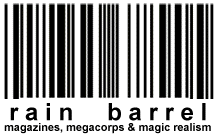Whenever something
big happens, I usually can't immediately comment on it because I'm filled
with so many tangled and confused thoughts that I tend to run at the mouth
and contradict myself every other sentence. And so I dwell and try to gestate
an opinion.
I've been dwelling on
the FTAA - "Free Trade Area of the Americas" or "Fuck the Already Affluent"
depending on what side of the symbolic
fence you are on (link to Rick
Salutin's Globe and Mail article expires in seven days).
I found news coverage
of the FTAA lacking. It seemed their were only two stories: "Lets watch
those crazy violent protesters" and "Anyone who criticizes free trade is
an idiot".
What infuriated me about
the latter stories is that the authors generally just responded with statements
such as "trade is good for democracy" that were so obviously true in their
minds that they didn't feel the need to provide any explanation.
There were so many stories
not pursued:
Why isn't the FTAA being structured
like the EU with national referendums and elected representatives? The
EU is the only body recently that has stood up against corporate mega-mergers.
Could the FTAA do the same?
True free trade has three components: freedom
of movement of capital; freedom of movement of goods; and the conveniently
ignored freedom of movement of labour. How will the FTAA change the flow
of people through borders?
Will the existence of the FTAA encourage
or discourage sweatshops?
Why would a country willingly make itself
vulnerable to be sued by corporations?
The FTAA is stated to be only for countries
that are democracies but not socialist counties like Cuba. That being said,
not so long ago, the American government actively promoted the likes of
Augusto Pinochet over a democratically elected socialist. Will FTAA
allow for trade sanctions be used to encourage American-approved governments?
Qui bono?
Is the fact that George W. Bush might win
more US Latino voters by pursuing the FTAA is a good enough justification
to pursue such a wide-ranging trade deal?
Last year their were riots in Bolivia over
the privatization of water. Most
people didn't learn about this in the traditional media outlets. How
can we trust the same bodies to accurately report on the FTAA?
But the untold story
that I keep searching for is this: the stock market just ended a mind-boggling
spout of "irrational exuberance" in
which billions of dollar left the pockets of the many into the bank accounts
of a few (link from Robot
Wisdom)...
(Government inefficiency
is flouted as proof that business should be allowed in the non-profit sectors
of education and health-care. "New economy" inefficiency is shrugged off
as a "market correction")
... why would we possibly
want to risk national sovreignity in such an insane environment?
The answer is... it doesn't
matter as we already have lost control: mutual
fund managers run the world. (Saturday Night link
expires in seven days)
From all these disparate
thoughts, I have warmed up to a general conclusion:
There are those who tell
us to think of The
Market as the true democracy.
And then there are those
who see The Market as a casino. Like myself, they are the ones who can't
help but noticing that while there are winners and losers in The Market,
the house always comes away with a profit.
We want to change the
odds.

